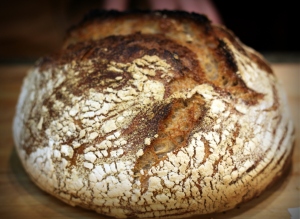by Tara Kelly
Last week Jeremy Zietz led a workshop about baking sourdough bread at the PEG TV kitchen studio in Rutland. In a departure from my normal routine, I decided to attend (after all, he was donating the class fees to RAFFL). Given my full schedule, I didn’t think I would actually follow-through and bake bread. Yet, there I was in a room full of (potential) bakers. Jeremy had a philosophical and funny approach that engaged me. He had structured the class specifically toward people that work a full-time job. His class left me thinking maybe I CAN do this.
After helping the kids with their school fundraiser on Saturday morning, I found myself reading through Jeremy’s instructional booklet, feeding the sourdough “levain”, and plotting out how I would take the sourdough through the various stages of fermentation over the course of the weekend.
This type of bread making can’t be rushed. As I carefully worked my way through the steps, my thoughts turned to my favorite puzzle: how to create food systems that give people easier access to good, healthy foods while those who labor to produce the food are treated fairly. The process of sourdough bread making provided interesting parallels to RAFFL’s work.
Start With What Worked in the Past Then Build for the Future
The first ingredient in sourdough bread is a lump of dough that someone has given to you. This lump is likely several generations old. It has moved from person to person across time being fed and nourished by each person along the way. And yet, it is viable and bursting with energy: the perfect start to a future loaf of bread.
RAFFL began on the shoulders of many generations of farmers in this rural county. These farmers who tended their fields and animals while they also tended their communities make Rutland County a great place to live. When the systems for producing and transporting food went national and then international, the economic underpinnings of small, local farms suffered. As people around the country began to understand the failings of that system, the costs to human health and rural economies, they began to take action. In this context, RAFFL was born. Vermont is fortunate that we haven’t ever completely lost the knowledge, land base and community connections that others are seeking. We had saved the essence from which to build into the future.
Trial and Error, Adapt and Improve
Jeremy mentioned a dozen times that sourdough bread making requires experimentation. There is a basic recipe that can be followed. But, to succeed requires a willingness to take risks, do your best, learn from your mistakes, and adapt for the next time.
Farmers are masters at trial and error. Every seed that is planted, every animal on the farm, every new acre of land that is turned over is an experiment. Calculated risks are part of the business. Likewise, RAFFL and similar organizations are working on complex issues in a rapidly evolving industry. This takes a nimbleness and willingness to try new things that are unproven. It means scanning the environment for best practices while also thinking outside the box. It means being grounded in the realities of basic economic theory while also seeking to shift and change the “laws” by creating new and innovative approaches built on a set of values that go beyond basic supply and demand rules. It means taking the time to review what is working, what is not, and then adapt. As Winston Churchill once said, “However beautiful the strategy, you should occasionally look at the results.”
Patience: Don’t Overwork it – Let it Rest – Stay on Track
One of the key instructions in the sourdough recipe repeats several times, “let the dough rest for up to 8 hours.” It requires patience and planning in order to stay on track. As a person of action, I found it challenging to operate this way. But, it is key.
When RAFFL began we had big ideas about shifting the farm and food system in our region. As it turns out, some ideas were a bit cart before the horse; others weren’t needed at all. The due diligence we conducted to get to those conclusions was a lot of work, and it took time. Eventually, we realized that a non-profit organization relying on grants and subsidies should not create a parallel to the existing supply chain. At that point we turned our attention to implementing projects that are not as flashy, but which are steadily creating the change we seek. We are building partnerships with private enterprise to achieve a common good. To reach our goal we need to keep our eye on the prize.
Pass it On
Receiving a gift from the past, making a mark on it, and then passing it forward is extremely rewarding. I’ve already passed on chunks of dough to a couple of neighbors so they can make their own bread. And the chunk I kept for myself will need feeding and watering if it is going to be useful in the future (Jeremy referred to the levain as his pet – now I know why). The same is true for the work we are doing to invest in local farms so that our local agricultural economy works and grows into the future. The work we are doing today is bubbling and growing — creating spin-off projects and new initiatives here and around the state – leaving a legacy for generations to come.
